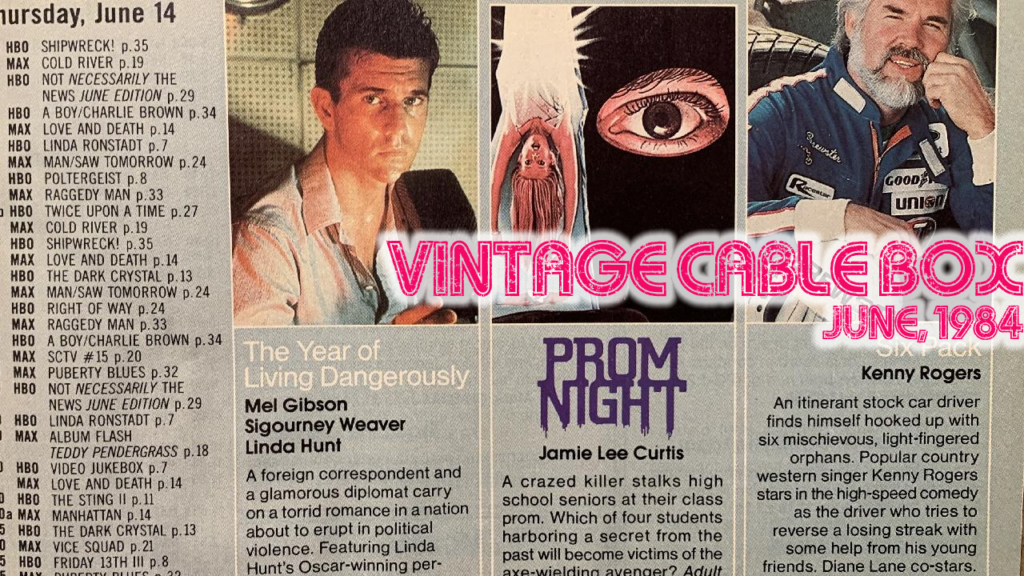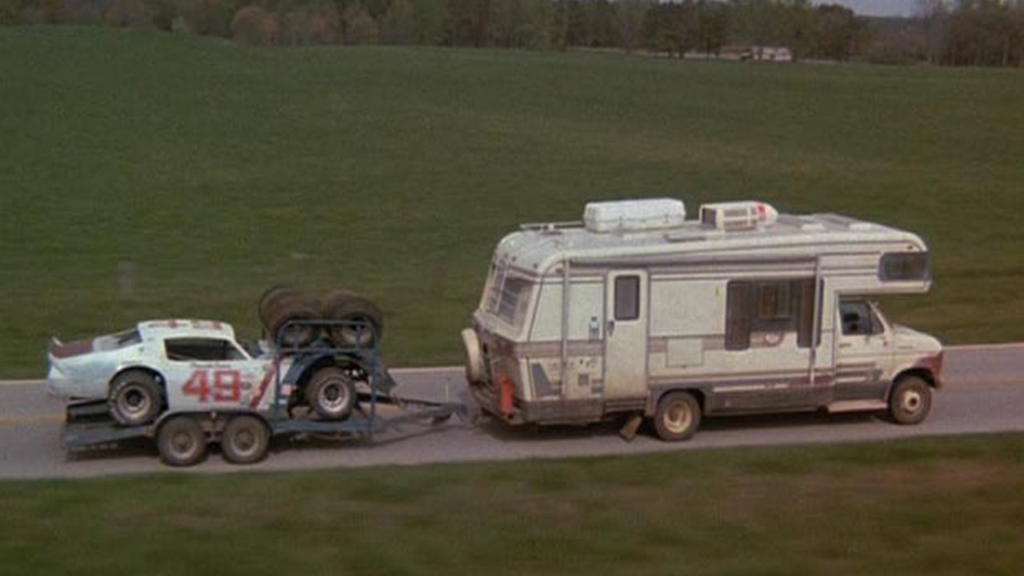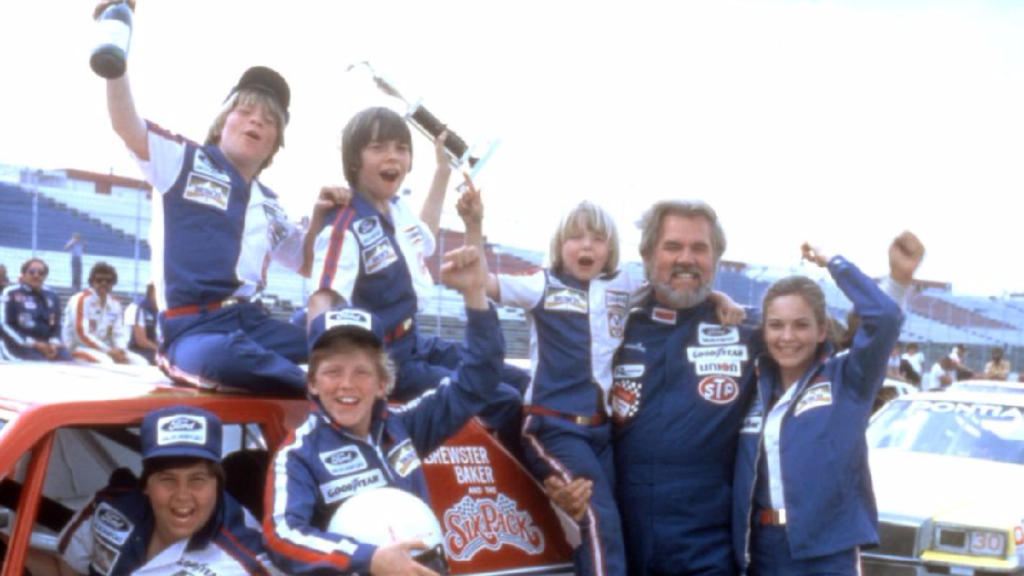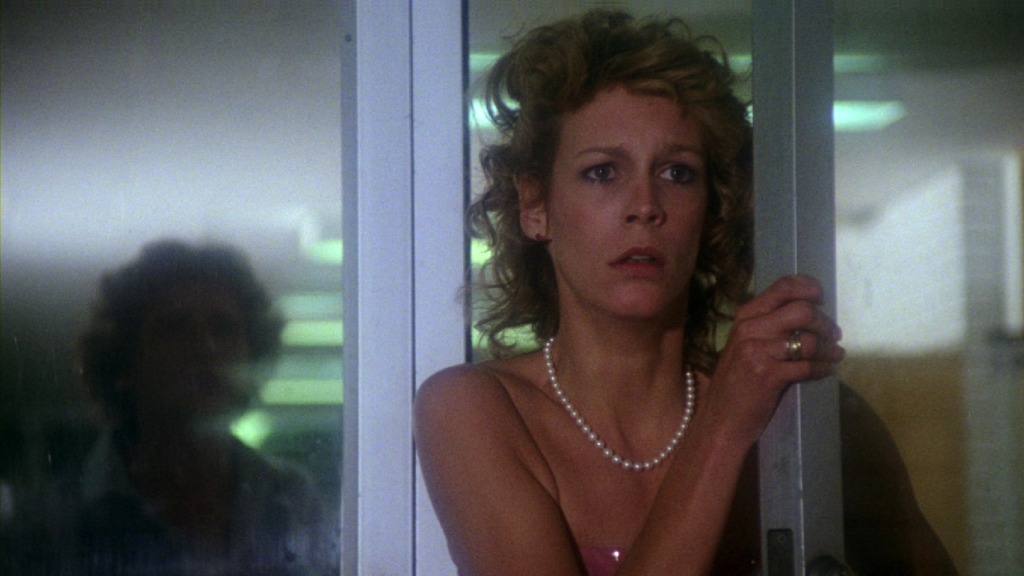Vintage Cable Box June 1984: Six Pack-The Year of Living Dangerously-Prom Night

Six Pack, 1982 (Kenny Rogers) 20th Century Fox
“Drive it ’till you hear glass and smell shit!”
I wonder if we don’t need a little love and joy in our lives right now. Everywhere I look, people are miserable, people are suffering. Even starting up Six Pack with Kenny Rogers’ “Love Will Turn You Around” already makes me feel like a million bucks. The last couple of days around here during the Christmas season drag me down. I always liked Kenny Rogers. He had crossover appeal.
It’s okay by me that he’s not your classically trained thespian. The guy has presence. Director Daniel Petrie wisely allows Kenny to inhabit the part naturally rather than attempt a “performance.” Too many so-called established actors do nothing more than play themselves to entertaining effect, but Rogers is fine doing the same thing because he isn’t stealing roles from talented actors looking for work.
As Brewster Baker, Kenny’s just a ne’er do well race car driver who gets jacked and upturned in a small town. A bunch of stray children (among them Diane Lane and Anthony Michael Hall) steal auto parts. I don’t know how they go about selling those parts since it’s more than obvious they’re hot, but for the purposes of the story, it brings Kenny together with his “six pack,” the criminal moppets responsible for the thefts.

He drives them straight into a lake and rescues them when they nearly drown. I guess times are tough in Reagan’s 1980’s Texas, but I tend to blame the economic downturn starting in the mid ’70s. Stories of optimism were gaining traction after the recession of the ’70s. Unfortunately, the kids can’t help him with his parts as those were already sold, so (noticing their uncanny ability with repairs) he puts them to work as his pit crew for an upcoming race in Shreveport’s Dixie 100.

Meanwhile they run afoul of corrupt sheriff “Big John” (the great Barry Corbin doing what he does best) and when Brewster tries to protect them, he gets arrested. The kids bust him out of jail, sabotage the sheriff’s ride, and take to the road. I’m glad this movie didn’t end Thelma & Louise style. Particularly after Brewster beats up a deputy in his jailbreak. In Louisiana, Brewster romances ex-girlfriend, Lilah (Erin Gray) while the kids steal parts from other cars to fix up his car.
I wonder where they got their skills. Maybe that’s a question I shouldn’t be asking. They move from race to race and (with Lilah) become an extended family. Six Pack is such a charming movie, (with its heart in the right place) I can’t think of any reason why it shouldn’t be seen. It’s a heartwarming story of a lonely man who is adopted by a family of orphaned children.
It’s interesting to me that all of the kids have distinct personalities. It’s as if time was spent with the kids getting it right for the benefit of serving the story. The movie gets a little repetitive with Corbin’s repeated efforts to arrest and lock up the kids. He even shows up to ruin Brewster’s last race, abducting the children right before the start of the Atlanta 500. Six Pack made back its budget, but it was on HBO that the movie achieved well-deserved cult status.
The Year of Living Dangerously, 1983 (Mel Gibson) MGM/UA
“We’re not quite at home in the world.”
Do you ever wonder why Americans stay safely away from international conflict? Why they pretend they’re not hearing explosions and screams even as they creep up behind them in shadowy doorways and dirt-encrusted alleys? “We can’t afford to get involved,” Mel Gibson’s Guy Hamilton says early in the movie. He’s a naive, young Australian journalist in Jakarta in 1965, and all he cares about is getting the story.
There’s something to be admired about him. He wants undiluted fact, but he also wants prestige. He’s surrounded by bored Americans and Brits, drunken diplomats, and jaded envoys. It makes me think about the state (and shape) of things today. Young Americans are angry when it comes to the outside spectrum, the spheres of evil, of influence, the powerless under the spell of the powerful.
They protest, yes, but what are they protesting? How could they possibly know what another man feels? I know I don’t know. I know everything will unfold regardless of my interference, or lack thereof. I also know that eventually every man will be free. Kids don’t get that. They don’t get it ’cause they’re kids. Power is something very few of us understand. Linda Hunt’s Billy (in an incredible performance) acts as Hamilton’s go-between, arranging interviews with the people most journalists either don’t know about, or can’t reach.

Communist aggression in Jakarta is being ignored by the Western powers, and because despot Sakarno needs foreign aid (and weaponry), he has no choice but to accept their tutelage. Hamilton’s no-nonsense approach to presenting the untainted story infuriates the Soviet-hating Americans, among them Pete Curtis (Michael Murphy) who considering his demeanor, I would’ve pegged for a CIA agent.
When Hamilton meets Embassy secretary Jill Bryant (Sigourney Weaver), the sparks fly, and this is why the movie was sold as a romance rather a political thriller. Indeed, one of the more sublimely romantic moments in the history of film has Weaver arriving at Gibson’s office (to the music of Vangelis’ “L’enfant”) and kissing him passionately in the outside hallway. We get wonderful character moments such as Billy’s devotion to his shadow puppets.
This movie was considered part of (and the end of) the “New Wave of Australian Film.” Director Peter Weir was among the first of those filmmakers. On to Linda Hunt. It isn’t so much that she is a female playing a male. It’s odd how so far removed from a performance a qualifying gender can be. I would never have cared what Billy was because he keeps us invested in his ambiguity.
By giving us an inkling of his terrors and desires, he becomes a stranger and a familiar entity at the same time, like any human being we come across. What’s more I don’t think Linda Hunt accesses any special brand of emotion in playing Billy. The stories he tells are brilliant, and it is Billy’s voice that reminds us of our humanity even as we watch atrocity after atrocity in the real world. I wish we had that voice right now.
Prom Night, 1980 (Jamie Lee Curtis) AVCO Embassy Pictures
“Killer’s coming! Killer’s gonna get you!”
On March 12, 2023, Jamie Lee Curtis received an Academy Award for her performance in Everything Everywhere All At Once. Curtis was rather ambiguous in her gratitude for being cast in what she called, “genre,” films. Genre is an interesting word choice because it replaces (and ultimately dismisses) “slasher,” even though the slasher film is a subgenre of the horror genre.
Every movie in the universe is associated with a corresponding genre. Kramer vs. Kramer is a drama movie. Drama is a genre. Get it? So, I thought Curtis’ speech was lacking in respect to the slasher movies that started her career, as well as the choices that came after that resulted in her being regarded as a serious actress. That’s not to take away from her performance in the movie.
She was so good, I had no idea the character was being played by Jamie Lee Curtis, and that is what a real actor should achieve. Like Linda Hunt, she disappears inside a role. She was wonderful in an otherwise pedestrian, forgettable multiverse chick flick. In her acceptance speech, Curtis does not mention Halloween, Prom Night, or Trading Places. She does not thank John Carpenter (for turning her into a scream queen/movie star) or John Landis (for transforming her into a serious actress).

I found that disingenuous because as much as she and others would like us to forget that she had her start in slasher movies, she was still a top-notch actress in those movies. Prom Night is no exception. Ten years ago, a bunch of kids are playing a variation of “tag” in an abandoned schoolhouse situation. The kid who gets caught is “killed,” but in this case, the kid falls out of a window and is literally killed.
The other kids all vow to keep it secret that they had anything to do with her death. It’s kind of terrible when a movie begins with a child’s death, but it is an important part of a slasher movie’s formula. A child’s death is an unforgivable and unjust tragedy, and it provides the catalyst for a revenge fantasy (even though this may not be a revenge fantasy). In the present, those kids have grown up and are now high schoolers (Jamie Lee being one of them) getting ready for the prom.
As with most movies like this, the kids are a bit too old to look like high schoolers, but I guess back then you had more stringent rules about child actors in horror movies. In the run-up to prom night, the kids start getting phone calls which, of course, they chalk up to pranks, but during the event, the killings begin. There are the requisite topless scenes and make-out sessions. There are also the red herrings, like the bully, Lou (David Mucci) we have to assume is the killer for much of the running time until we see him get menaced near the end.
Prom Night has an interesting cast. Leslie Neilsen (in one of his sparse dramatic roles post Airplane!—Creepshow and Nuts being the others) plays Jamie Lee’s high school principal father. Antoinette Bower plays her mother. David Cronenberg regular Robert A. Silverman plays the school’s creepy janitor, Mr. Sykes. By movie’s end, we come to realize that the killer’s motivation was not a sick fetish but a festering guilt and complicity in the death of the young girl. That’s what makes Prom Night unique in the slasher genre.

